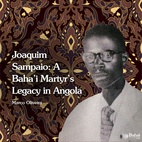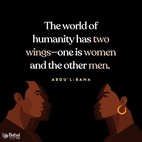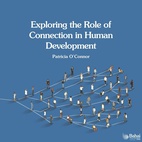The views expressed in our content reflect individual perspectives and do not represent the authoritative views of the Baha'i Faith.
Would humanity benefit if the people doing science were more diverse, more varied in their approaches, and more engaged with a wider variety of community problems?
Or should only a privileged few ever become scientists and determine which research topics might best address the world’s needs?
In my understanding, this issue of diversity in science overlaps with some important principles and themes in the Baha’i teachings. It also comes up in my university work in a social science area called research policy, which examines how science can be organized, funded, and rewarded in different ways.
Those who study this field have come to understand that a lack of diversity does lead to problems. Unfortunately, public funds in many countries often end up disproportionately in the hands of only a few scientists. This scientific elite then gets to wield very significant control over the directions in which science ultimately develops.
RELATED: Can Science and Morality Find Common Ground?
An article from early 2022 studied this diversity in science issue for the current U.S. scientific workforce. It used U.S. census data to estimate researcher ethnicities, then worked out who wrote scientific papers and what topics they addressed. The study concluded that:
The US scientific workforce is not representative of the population. … [It] is primarily composed of White men. … We find a strong relationship between the characteristics of scientists and their research topics … Science policies should consider this relationship to increase equitable participation in the scientific workforce … To enhance the robustness of science, research organizations should provide adequate resources to historically underfunded research areas while simultaneously providing access for minoritized individuals into high-prestige networks and topics.
This article proposed that the United States should address its historical lack of diversity in science, and correct which topics receive most attention. For me, this connects to a broader question tackled in the Baha’i teachings: Should everyone have the right to do science? After all, in his writings Baha’u’llah taught that the acquisition of knowledge is everyone’s duty:
Arts, crafts and sciences uplift the world of being, and are conducive to its exaltation. Knowledge is as wings to man’s life, and a ladder for his ascent. Its acquisition is incumbent upon everyone.
When scientific knowledge increases, it uplifts “the world of being” – potentially making existence better for all people. To increase scientific knowledge, we must expand it beyond something only a small cohort does, like those fortunate few who already have professional careers in research. The Baha’i teachings instead recommend humanity should aim towards having “universal participation” in generating, applying, and diffusing knowledge, and consider creating knowledge as “a responsibility that all must shoulder:”
The perpetuation of ignorance is a most grievous form of oppression; it reinforces the many walls of prejudice that stand as barriers to the realization of the oneness of humankind, at once the goal and operating principle of Baha’u’llah’s Revelation. Access to knowledge is the right of every human being, and participation in its generation, application and diffusion a responsibility that all must shoulder in the great enterprise of building a prosperous world civilization — each individual according to his or her talents and abilities. Justice demands universal participation.
That statement, from the democratically-elected global leadership body of the world’s Baha’is, the Universal House of Justice, affirms that everyone being able to absorb and produce knowledge is a prerequisite for achieving justice and ending oppression. Reaching this kind of universal participation calls for profound changes to academic education and careers, both in their content and in who can access them. It may also require a reconsideration of where knowledge can be generated, which does not always have to be exclusively within university and college settings.
Increasing participation is also discussed in another research area I have studied, in policies for community infrastructure development. For many decades, sadly, some researchers here carried with them problematic mindsets that disregard the value of local perspectives and overlook grassroots capacities. In dealing with such problems, the Baha’i community attempts to offer new ways of thinking about participation in the overall development of society, both at local and global levels:
What appears to be called for … is the involvement of a growing number of people in a collective process of learning, one which is focused on the nature and dynamics of a path that conduces to the material and spiritual progress of their villages or neighbourhoods. Such a process would allow its participants to engage in the generation, application, and diffusion of knowledge, a most potent and indispensable force in the advancement of civilization. … To facilitate the systematization of knowledge, appropriate structures have to be put in place at the local level, among them institutions and agencies invested with authority to safeguard the integrity of the learning process and to ensure that it is not reduced to opinion or the mere collection of various experiences—in short, to see to it that veritable knowledge is generated. … [A] process of learning at the local level will remain limited in its effectiveness if it is not connected to a global process concerned with the material and spiritual prosperity of humanity as a whole. Structures are required, then, at all levels, from the local to the international, to facilitate learning about development.
RELATED: Science and Religion: Making Room for the Heart and the Spirit
Overall, these Baha’i perspectives reflect some of the new ideas now appearing among the scientific and research communities. Academic researchers now try to involve more people in knowledge generation, for example through “citizen science” programs, and by calling for scientific findings to be accessible to all through “open science” initiatives. This can allow people to combine or contrast their own knowledge with systematic insights generated elsewhere, ensuring that knowledge produced is indeed “veritable” and meets required standards of quality and integrity.
My hope is that these Baha’i and like-minded academic community trends eventually empower more people to engage in generating knowledge and doing science. This would help local communities learn better how to overcome their own problems. It would also expand our thinking, so that we see humanity indeed has a whole treasure trove of capacity available to tackle the many daunting global challenges we collectively face.

















Comments
Sign in or create an account
Continue with Googleor